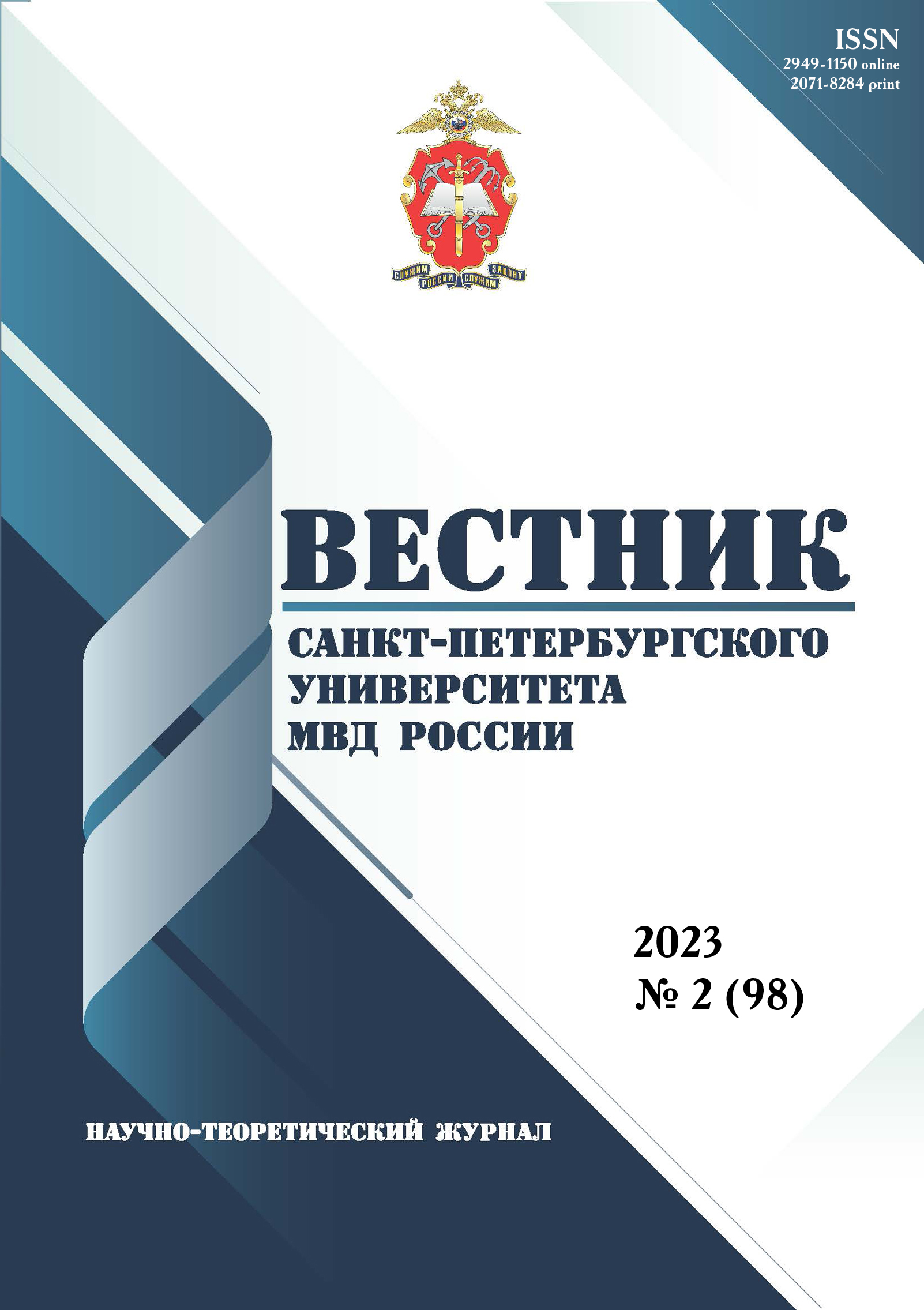Saint Petersburg, St. Petersburg, Russian Federation
VAK Russia 5.1.1
UDC 340.11
CSCSTI 10.07
Russian Classification of Professions by Education 40.00.00
Russian Library and Bibliographic Classification 6
Russian Trade and Bibliographic Classification 7
BISAC LAW LAW
Abstract: the digitalisation of the processes of modern life contributes to the emergence of new lawmaking technologies aimed at defining the scope of legal regulation and establishing its limits. The use of crowdsourcing in law-making activities makes it possible to correlate the positions of society and the state regarding the possibility and necessity of regulating certain social relations. The purpose of the study: to reveal the essence of law-making crowdsourcing as an independent lawmaking technology, to determine its significance for establishing the limits of legal regulation. Research methods: general scientific methods and methods of cognition (systemic, analysis, synthesis, induction, deduction, generalisation, comparison, etc.) and special scientific methods (formal legal, comparative legal). Results: Law-making crowdsourcing is a new technology and one of the deliberative procedures aimed at optimising the establishment of the scope of legal regulation and fixing it as a subject of legal regulation. There are three main types of law-making crowdsourcing, depending on the objectives and content pursued: crowdsourcing of issues, crowdsourcing of ideas, and crowdsourcing of draft legislation. Certain conditions need to be taken into account in order for crowdsourcing to produce the desired results and improve the effectiveness of legal regulation, as well as problems and shortcomings due to both the specificity of the technology and peculiarities of the public consciousness.
limits of legal regulation, scope of legal regulation, subject of legal regulation, lawmaking crowdsourcing, legitimisation of law
1. Zayceva E.S. Predely pravovogo regulirovaniya (obscheteoreticheskiy aspekt). - Omsk: Omskaya akademiya MVD Rossii, 2020. - 153 s.
2. Denisenko V.V. Legitimnost' prava (teoretiko-pravovoe issledovanie). - Moskva: Prospekt, 2022. - 240 s.
3. Antonov M.V. Legitimnost' i deystvie prava // Trudy Instituta gosudarstva i prava Rossiyskoy akademii nauk. - 2018. T. 13. - № 3. - S. 48-81.
4. Denisenko V. V., Trikoz E. N. Deliberativnost' i aleatornye procedury kak legitimaciya somaticheskih prav cheloveka: opyt Respubliki Irlandiya i Avstraliyskogo Soyuza // Gosudarstvo i pravo. - 2023. - № 1. - S. 100-113.
5. Dolzhenko R. A. Kraudsorsing kak instrument dorabotki normativnyh dokumentov v organizacii vozmozhnosti i ogranicheniya (na materialah OAO «Sberbank Rossii») // Izvestiya vuzov. Seriya «Ekonomika, finansy i upravlenie proizvodstvom». - 2015. - № 1 (23). - S. 67-75.
6. Voplenko N. N. Zakonnost' i legitimnost' // Novaya pravovaya mysl'. - 2003. - № 1. - S. 11-14.
7. Estellés E., González-Ladrón-De-Guevara F. Towards an integrated crowdsourcing defi nition // Journal of Information Science. 2012. 38 (2). URL: https://doi.org/10.1177/0165551512437638. - Cit po: Zaloilo M. V., Bazykin A. Yu. Instrumental'naya cennost' tehnologii kraudsorsinga v prinyatii pravotvorcheskih resheniy // Pravovye cennosti v svete novyh paradigm razvitiya sovremennoy civilizacii: sbornik nauchnyh trudov. - Moskva: Institut zakonodatel'stva i sravnitel'nogo pravovedeniya pri Pravitel'stve Rossiyskoy Federacii: Infra-M, 2020. - 430 s.
8. Zaloilo M. V., Bazykin A. Yu. Instrumental'naya cennost' tehnologii kraudsorsinga v prinyatii pravotvorcheskih resheniy / Pravovye cennosti v svete novyh paradigm razvitiya sovremennoy civilizacii : sbornik nauchnyh trudov. - Moskva: Institut zakonodatel'stva i sravnitel'nogo pravovedeniya pri Pravitel'stve Rossiyskoy Federacii: INFRA-M, 2020. - 430 s.
9. Ponomarev S. V. Kraudsorsing - tehnologiya sozdaniya virtual'nyh soobschestv // Vestnik Permskogo universiteta. Politologiya. - 2011. - № 3 (15). - S. 107-121.
10. Burov V. V., Patarakin E. D., Yarmahov B. B. Ispol'zovanie tehnologiy kraudsorsinga v zakonotvorcheskoy deyatel'nosti // Biznes-informatika. - 2011. - № 2. - S. 12-19.
11. Lobova S. V., Dolzhenko R. A. Napravleniya ispol'zovaniya kraudsorsinga dlya resheniya gosudarstvennyh i obschestvennyh zadach v regione // Regional'naya ekonomika: teoriya i praktika. - 2016. - № 2 (425). - S. 135-148.
12. Burov V. V., Patarakin E. D., Yarmahov B. B. Prodvizhenie social'nyh innovaciy cherez obschestvennoe konstruirovanie dokumentov // Obrazovatel'nye tehnologii i obschestvo. - 2012. - T. 14. - № 2. - S. 517-535.
13. Zayceva E. S. Yuridicheskoe prognozirovanie kak sredstvo ustanovleniya predelov pravovogo regulirovaniya // Nauchnyy vestnik Omskoy akademii MVD Rossii. - 2021. - T. 27. - № 3 (82). - S. 221-225.
14. Lapaeva V. V. Sociologicheskoe obespechenie zakonotvorchestva // Sovetskoe gosudarstvo i pravo. - 1989. - № 10. - S. 27-35.
15. Usmanov B. F. Kraudsorsing: innovacionnye tehnologii dlya mestnoy iniciativy // Znanie. Ponimanie. Umenie. - 2013. - № 3. - S. 80-85.
16. Golovina A. A. O koncepcii pravotvorcheskoy politiki v Rossiyskoy Federacii v XXI veke // Zhurnal rossiyskogo prava. - 2019. - № 4. - S. 20-32.
17. Beyker D. Innovaciya modeli biznesa cherez «kraudsorsing» s ispol'zovaniem social'nyh setevyh platform // Problemy upravleniya v social'nyh sistemah. - 2012. - T. 4. - № 6. - S. 87-99.
18. Mamchun V. V. Kul'tura riska v yuridicheskoy deyatel'nosti // Yuridicheskaya tehnika. - 2016. - S. 400-406.
19. Shirky C. Cognitive surplus: Creativity and generosity in a connected age. Penguin Press HC, 2010. - Cit. po: Ponomarev S. V. Kraudsorsing - tehnologiya sozdaniya virtual'nyh soobschestv // Vestnik Permskogo universiteta. Politologiya. - 2011. - № 3 (15). - S. 107-121.
20. Nasyrov I. R., Savel'ev I. L. Tehnologii kraudsorsinga v gosudarstvennom upravlenii // Uchenye zapiski Kazanskogo universiteta. Seriya: Gumanitarnye nauki. - 2012. - T. 154. № 6. - S. 94-104.














